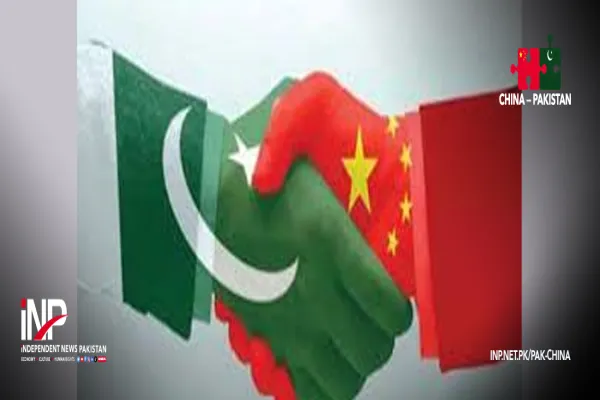i NEWS PAK-CHINA
This year marks the 10th anniversary of China‘s neighborhood diplomacy under the principles of amity, sincerity, mutual benefit and inclusiveness that shows the great importance China attaches to nurturing good relations with its neighbors based on mutual and meaningful consultation for developing a shared future for humanity under the theme of win-win situation. The symposium was held in Beijing to celebrate the achievements gained in the first decade of neighborhood diplomacy that has generated a message that China’s diplomacy with neighboring countries is a priority in its diplomatic agenda that has brought opportunities of cooperation and development based on shared success. Since the founding of Peoples Republic of China (PRC), Chinese government has attached great importance to diplomacy with their neighbors.
Guided by the policy of good neighborliness and friendliness Chinese leadership under the vision of Communist Party of China have developed a series of important strategic ideas and policies to initiate generally favorable environment for China’s modernization. Since its reform and opening up , the rapid growth of China’s economy and the rise of its international status , China’s diplomacy with neighboring countries has featured more prominently in China’s overall diplomacy. After entering the new century, the Chinese government formally proposed that ‘the development of its relationship with neighboring countries should top China’s diplomatic agenda’.
Whether it is in terms of geographical location, natural environment or mutual relations, the diplomacy with neighboring countries is of extremely important strategic significance to China. Since the 18th Communist Party of China (CPC) National Congress, while maintaining the consistency and stability of diplomatic policies and principles, China has made comprehensive arrangements for its overall diplomacy, highlighting the important role of neighboring countries in China’s overall development and diplomacy. In November 2014, the foreign affairs work conference held by the CPC central committee laid more emphasis on diplomacy with neighboring countries and made it the top priority of China’s diplomatic strategic arrangements. At the 19th CPC National Congress, it was underlined that China will deepen relations with its neighbors in accordance with the principles of amity, sincerity, mutual benefit, inclusiveness and the policy of forging friendship and partnership with its neighbors.
China remains firm in its commitment to forging a new form of international relations featuring mutual respect, fairness, justice and win-win cooperation and working to build a community with the shared future for humanity. We have witnessed that China’s good neighborly diplomacy stems from the tradition of loving peace and opposing aggression. Since the ancient times, China has upheld integrity and good neighborliness and has been willing to treat neighboring countries sincerely and coexist with them on friendly terms. Having good relations with neighbors and friendliness in general are deeply in Chinese cultural tradition. Since reforms and opening up, and in particular after the cold war, China’s leaders have insisted on good-neighborly relations and friendliness in order to develop a favorable environment with its neighbors for China’s modernization drive and to serve as a guideline for resolving disputes with neighboring countries. Under the guidance of its good neighborly diplomatic ideology, China has always advocated the resolution of controversial problems through friendly consultation and negotiation with its neighbors that has enhanced the China’s global status.
Since the beginning of the 21st century, China has been upholding the policy of forging friendship and partnership with its neighbors, and fostering an amicable, stable and prosperous neighborhood, which enriches the connotations and measures of the diplomatic thinking of promoting friendship and partnership with its neighbors. The report of the 18th National CPC Congress highlighted that China would remain committed to good neighborly diplomacy and stressed that China would work hard to develop itself so as to bring even more benefits to its neighbors. This policy has set the course for China’s good neighborly diplomacy and field diplomacy. At the conference on diplomatic work with neighboring countries held on October 24, 2013, President Xi emphasized that basic principle of China’s diplomacy with its neighboring was that China would always pursue friendship and partnership with its neighbors and seek to bring friendship, security and common prosperity to it’s neighborhood, thus stressing the concepts of ‘intimacy, sincerity, mutual benefit and inclusiveness’.
Intimacy here means that China is committed to good neighborly relations, friendliness and mutual assistance, and that China attaches importance to equality and sincerity, frequently engaging with its neighbors. In addition, with the passage of the time, China has acted more kindly and positively towards neighboring countries to strengthen friendship and gain more recognition and support from them to enhance China’s accessibility and diplomatic outreach. Sincerity refers to the sincere treatment of neighboring countries to attract more friends and partners. Mutual benefits means to base China’s cooperation with neighboring countries on mutual benefits from to develop close networks of common interests and drive the convergence of mutual interests so that neighboring countries can benefit from China’s development and in turn China can also benefit from the common development of neighboring countries.
Inclusiveness refers to the notion of being accommodative. In this era of enhanced connectivity when Belt and Road Initiative is also entering into the 2nd decade of development, China’s diplomatic concepts and strategy has advanced the national interests and advanced the building of a community with the shared future of humanity with the global community by upholding peace, promote development and pursue cooperation and mutual benefits at both regional and international level.
Credit: Independent News Pakistan (INP) — Pak-China









